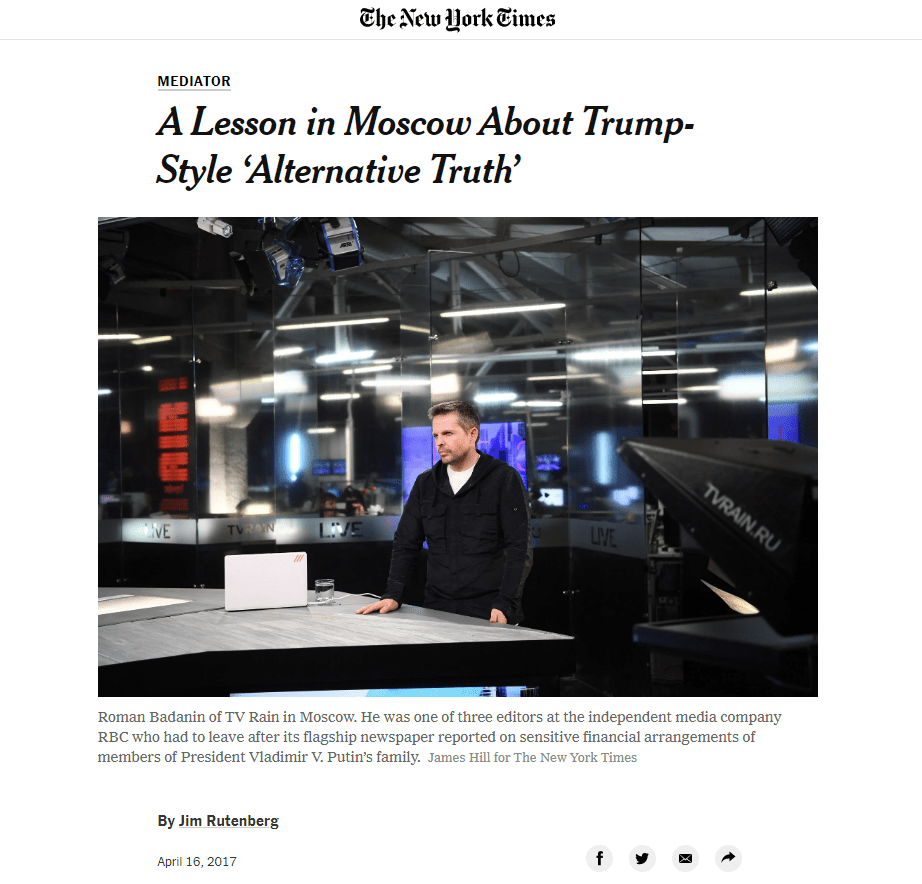The accuser is joined by other liberal, anti-Putin Russian reporters who say the Times has taken their stories without giving any credit, Ben Norton reports.
 The New York Times has been accused for a second time of stealing major scoops from Russian journalists. One of those stories won the Times a Pulitzer Prize this May.
The New York Times has been accused for a second time of stealing major scoops from Russian journalists. One of those stories won the Times a Pulitzer Prize this May.
The journalists who have accused the Times of taking their work without credit also happen to be the same liberal media crusaders against Russian President Vladimir Putin who Western correspondents at the Timesand other mainstream outlets have cast as persecuted heroes.
The Pulitzer Prize Board is comprised of a who’s who of media aristocrats and Ivy League bigwigs. Given the elite backgrounds of the judges, it is hardly a surprise that they reward reporting that reinforces the narrative of the new U.S. Cold War against official enemies like Russia and China.
Stephen Kinzer, a former New York Times correspondent who has since become a critic of U.S. foreign policy, noted that the three finalists in the Pulitzer Prize in international reporting “were one story about how evil Russia is and two about how evil China is. These choices encourage reporters to write stories that reinforce rather than question Washington’s foreign-policy narrative.”
The 3 finalists in the #PulitzerPrize2020 "international reporting" category were one story about how evil #Russia is and two about how evil #China is. These choices encourage reporters to write stories that reinforce rather than question Washington's foreign-policy narative.
— Stephen Kinzer (@stephenkinzer) May 5, 2020
The finalists nominated in this category were Reuters and The New York Times for two separate sets of stories.
The U.S. newspaper of record ended up winning the 2020 award in international reporting, for what the Pulitzer jury described as “a set of enthralling stories, reported at great risk, exposing the predations of Vladimir Putin’s regime.”
The Times was nominated again as a finalist for what the jury called its “gripping accounts that disclosed China’s top-secret efforts to repress millions of Muslims through a system of labor camps, brutality and surveillance.”
The staff of Reuters was selected as the third finalist for its reporting in support of anti-China protesters in Hong Kong. (The photography staff of Reuters ended up winning the Pulitzer Prize in breaking news photography for the same coverage.)
Among the five members of the Pulitzer jury who selected these finalists was Jeffrey Goldberg, the editor-in-chief of the neoliberal magazine The Atlantic and a former volunteer in the Israeli army who worked as a guard at a prison camp where Palestinians who rose up in the First Intifada were interned.
Joining Goldberg on the jury was Susan Chira, a former New York Times editor.
I’m proud and humbled to share a Pulitzer Prize with @ddknyt, @dionnesearcey, as well as @malachybrowne and his visual investigation wizards for our reporting on Russia’s shadow wars. https://t.co/yczpVAw1QW
— Michael Schwirtz (@mschwirtz) May 4, 2020
While this elite Pulitzer jury praised The New York Times for “at great risk, exposing the predations of Vladimir Putin’s regime,” it is not exactly clear what that “risk” is supposed to entail – because the major U.S. newspaper appears to have stolen at least part of its reporting from Russian journalists.
>>Please Donate to CNs’ 25th Anniversary Spring Fund Drive<<
On May 4, journalist Roman Badanin published a Facebook post accusing the Times of ripping off a story he had released months before without credit.
Badanin is the founder and editor-in-chief of the liberal anti-Putin news website Proekt, known as “The Project” in English.
“I have no illusions about the real role of Russian journalism in the world, but I have to note: the two The New York Times’s investigations, for which this honored newspaper won the Pulitzer prize yesterday, repeat the findings of The Project’s articles published a few months before,” Badanin wrote on Facebook.
“I would also like to note that the winners did not put a single link to the English version of our article, even when, for example, 8 months after The Project, they told about the activities of Eugene Prigozhin’s emissaries in Madagascar,” he added.
Badanin linked to an article he published, both in Russian and English, back in March 2019 titled “Master and Chef: How Evgeny Prigozhin led the Russian offensive in Africa.” The story details how the businessman Evgen? Prigozhin, who is sanctioned by the U.S. government, has been promoting business opportunities in Africa. The piece focuses specifically on Madagascar, where Russia also has a military agreement.
This report is eerily similar to a report published by The New York Times eight months later, in November, titled “How Russia Meddles Abroad for Profit: Cash, Trolls and a Cult Leader.” This story, which was filed in Madagascar, does not once link to or credit Proekt’s original reporting.
Another anti-Putin Russian news website, Meduza, published an article on May 7 drawing attention to these allegations, titled “‘Fuck the Pulitzer — I just want a hyperlink’: Russian journalists say ‘The New York Times’ should have acknowledged their investigative work in the newspaper’s award-winning reports about the Putin regime’s ‘predations.’”
Meduza interviewed Badanin, who said The New York Times “report about Madagascar from November 2019 repeats all the main and even secondary conclusions from our reporting about Madagascar and Africa generally between March and April last year.”
While Badanin did not outright accuse the Times of plagiarism, he was frustrated that “nowhere in the story did they acknowledge that we’d already reported on this topic,” and said it was either a “professional issue” or an “ethical problem.”
A New York Times spokesperson denied that Proekt’s reporting was used in any way. And the Times reporter who authored this report from Madagascar, Michael Schwirtz, responded dismissively to the accusations in a Twitter thread full of sarcastic quips.
‘The Insider’ Wants Credit Too
Michael Schwirtz authored another New York Times article in December that was cited by the Pulitzer jury for the 2020 prize. This piece, “How a Poisoning in Bulgaria Exposed Russian Assassins in Europe,” is also suspiciously similar to reporting published before by yet another anti-Putin website, called The Insider.
The Insider is edited by the Western-backed, diehard anti-Putin activist Roman Dobrokhotov. In response to Schwirtz’s Twitter thread, Dobrohotov angrily asked why The Insider’sreports were not credited as well. Schwirtz denied having used information from the previous stories.
Schwirtz’s Twitter thread tagged four Russian accounts: Proekt, The Insider, Dobrokhotov, and Yasha Levine, the last of whom is an occasional contributor to The Grayzone and the author of “Surveillance Valley.”
Levine reflected on the scandal writing, “Time to learn the hard truth: The New York Times — like the Empire it represents — doesn’t give a fuck about you. It’ll take whatever it wants, give nothing in return, and suffer no consequences. And who’ll believe you Russians anyway?”
Time to learn the hard truth: The New York Times — like the Empire it represents — doesn't give a fuck about you. It'll take whatever it wants, give nothing in return, and suffer no consequences. And who'll believe you Russians anyway? https://t.co/V1YtZ7K6OB
— Yasha Levine (@yashalevine) May 7, 2020
“The reverence with which liberal Russian journalists have treated the New York Times has always been baffling to me,” Levine continued. “But that’s what you get when you’re a colonial subject like Russia. You fetishize the master. That reverence is starting to wear off, but it’s still there.”
The reverence with which liberal Russian journalists have treated the New York Times has always been baffling to me. But that's what you get when you're a colonial subject like Russia. You fetishize the master. That reverence is starting to wear off, but it's still there.
— Yasha Levine (@yashalevine) May 7, 2020
Also Accused in 2017
This is not the first time that the U.S. newspaper of record has been accused of stealing reporting from Russian journalists.
Back in 2017, The New York Times won the Pulitzer Prize in international reporting for its reports on “Vladimir Putin’s efforts to project Russia’s power abroad.”
At the time, journalists from the anti-Putin website Meduza accused the Times of ripping off their reporting. The website Global Voices highlighted the controversy, in an article titled “Russian Journalists Say One of NYT’s Pulitzer-Winning Stories Was Stolen.”
Meduza reported Daniil Turovsky accused New York Times Moscow correspondent Andrew E. Kramer of lifting his reporting. Kramer actually took the time to respond in a Facebook comment, acknowledging that his report was based on that of the Russian journalist.
“Daniil, I spoke with you while preparing this article and explained that I intended to follow in the footsteps of your fine work, that I would credit Meduza, as I did, and thanked you for your help,” Kramer said.
This did not satisfy Meduza, which also reminded readers in its latest 2020 article that the Times had ripped off its 2017 reporting.
The NYT times has been honored with a Pulitzer Prize for “exposing the predations of Vladimir Putin’s regime” in 2019, but several top investigative journalists in Russia say the U.S. newspaper ignored their groundbreaking work in this area — again. https://t.co/R4WZdqHDp4
— Meduza in English (@meduza_en) May 7, 2020
The Grayzone has also experienced this kind of shameless journalistic pickpocketing. In March 2019, The New York Times released a report acknowledging that the “humanitarian aid” convoy that the U.S. government tried to ram across the Venezuelan border in a February coup attempt had been set on fire not by government forces, but rather Washington-backed right-wing opposition hooligans.
At the time of this Feb. 23 putsch attempt, the Times had initially joined U.S. politicians like Senator Marco Rubio and the majority of the corporate media in blaming Venezuelan President Nicolás Maduro. But The Grayzone Editor Max Blumenthal, who was reporting in Venezuela, published a report showing that all of the available evidence pointed to the opposition being responsible.
When the Times finally admitted this fact weeks later, it made no mention whatsoever of Blumenthal’s reporting. Glenn Greenwald was the only high-profile journalist to credit Blumenthal and The Grayzone.
First Lionizing, Then Robbing
Further compounding this staggering hypocrisy is the fact that The New York Times has in fact published numerous articles lionizing these anti-Putin Russian journalists, while simultaneously ripping off their work.
Proekt founder and editor, Roman Badanin, is not some kind of crypto pro-Kremlin activist – far from it. He has spent years working within mainstream outlets, and was previously the editor-in-chief of the decidedly anti-Putin Russian edition of Forbes magazine
Badanin does friendly interviews with U.S.-based neoconservative think tanks like the Free Russia Foundation, a right-wing anti-Putin lobbying group that appointed regime-changer Michael Weiss as its director for special investigations.
In an interview conducted by Valeria Jegisman, a neoconservative anti-Russian activist who worked as a spokesperson for the government of Estonia and now works at the U.S. government’s propaganda arm Voice of America, Badanin accused the Kremlin of spreading false information, claiming “Russia will continue its disinformation tactics.”
Badanin also called for “the West” to “support independent media projects with non-profit funding,” stating clearly: “I think that what the West can do is to continue to support independent media in the most transparent and clear way, and to stop being afraid of the million tricks that the Russian authorities come up with to force the West to abandon these investments.”
The Russian journalist’s pro-Western perspective has been rewarded. Badanin was honored by the European Press Prize, a program backed by Western governments and the top corporate media outlets in Europe, particularly The Guardian and Reuters.
Badanin was also given a Stanford John S. Knight international fellowship in journalism. Stanford University has established itself as an outpost for Russian pro-Western liberals, and its journalist fellowship program provides institutional support for dissidents in countries targeted by Washington for regime change.
Badanin’s extensive links to Western regime-change institutions should not come as a surprise to The New York Times; it has in fact honored him in numerous articles.
In 2017, the Timespublished an entire article framed around Badanin. Reporter Jim Rutenberg explained, “I wanted to better understand President Trump’s America… So I went to Russia.”
In Moscow, Rutenberg met with Badanin at the headquarters of the anti-Putin station TV Rain, which he described as a “warehouse complex here, populated by young people with beards, tattoos, piercings and colored hair. (Brooklyn hipster imperialism knows no bounds.)”
While praising Badanin and TV Rain, the Times also noted that the channel published a poll suggesting that the Soviet Union “should have abandoned Leningrad to the Nazis to save lives.”
The Times even featured Badanin prominently in the header image of the story — just two years before the same newspaper would go on to rip off his reporting.

The New York Times also reported on Roman Badanin in 2016 and 2011. It is abundantly clear the newspaper knew who he was.
The Gray Lady’s willingness to snatch Badanin’s reporting shows how little respect newspapers like The New York Times actually have for the anti-Putin journalists they claim to lionize. For the jet-setting correspondents of Western corporate media outlets, liberal Russian reporters are just tools to advance their own ambitions.
Ben Norton is a journalist and writer. He is a reporter for The Grayzone, and the producer of the “Moderate Rebels” podcast, which he co-hosts with Max Blumenthal. His website is BenNorton.com, and he tweets at @BenjaminNorton.
This article is from The Grayzone.
The views expressed are solely those of the author and may or may not reflect those of Consortium News.
>>Please Donate to CNs’ 25th Anniversary Spring Fund Drive<<

 By
By
A new neologism:
“Propagazzi” (n.) Propagandists and/or their agents posing as actual journalists. See also “Project Mockingbird.”
By and large (IMHO) “Prizes” -particularly those accorded the most MSM coverage – are merely mechanisms to promote and legitimize actions/narratives that further the global elites’ variable interests. They are just ballyhooed ceremonies for insiders to reward other insiders.
In short, they are marketing devices, nothing more.
It is worth pondering how the aggrieved intrepid Russian reporters make their living and where. Apparently they live in Moscow, there they publish and broadcast. Income comes largely from the West, giving rise to a new Russian word, sorosyata (little creatures grown by Soros and similar philantropic sources). On one hand, it shows that the image of the “authoritarian regime” is simplistic. The hand of law can be heavier on the opponents, but the same can be observed on the shores of Atlantic. But it seems that these people are classified as harmless, and perhaps useful.
They are easy to attack and despise, and they make perfect image of “self-hating confused liberals”. Or, “liberals”, the current Russian usage makes adjective redundant. BTW, in Poland the word most analogous is “lewak”, the usage is very similar.
Has anyone stopped to consider the damage done to the trust and credibility of governments and institutions if they are used, not for their ostensible purpose, but for propaganda and disinformation?
Thanks. Good piece.
I wonder how many of these so-called journalists like Schwirtz actually know anything – really – about Russia, Russian history, and not just what the westernized (international school products??) Russians like Badanin produce for them to read (and then plagiarize); or such anti-Russian, anti-other countries sovereignty, pro-exceptionalist USA think tanks as the Atlantic Council tell them is right?
The may have a knowledge about Russia or not. Regardless of that, they have a deep sense of belonging and solidarity: you choose your team, you cheer your team, you boo the opposing team. This is not a solitary activity. There are all kinds of good things that happen to your bank account and mental stage if you remain steadfast in spite of obstacles and inconvenient facts. And all kinds of bad things when you do not.
Open www (dot) youtube (dot) com/watch?v=6wH5WvWB7m0 and watch from 2:39 (make sure that innocent members of your household do not hear)
In his memoir “Reporter”, Seymour Hersh complained about this NYT practice of stealing and not giving credit so they’ve been doing this since at least the 70’s.
Piotr Berman:
Thanks for the youtube link, but I was informed “this video is unavailable.”
Thank you, Ben. A much appreciated story!
There is no honor among the flacks.
Stealin’, cheatin’ and lyin – för excellence in journalism, NYT
The Pulitzer Prize has a history of poor quality and even shabbiness. So much so, I long ago stopped regarding it as a real distinction.
A few times, prizes in journalism actually were awarded to Americans who had faked their stories entirely or in part.
The Pulitzers for books often have overlooked excellence and been awarded to mediocrity. It seemed to me that the subject or orientation of the book often mattered, as having a certain view of American history.
Now we can add theft
The citation for this award reads as if it were written in a basement office at Langley, Virginia, instead of at Columbia University.
Imagine a prize board using words like “predations of the Vladimir Putin regime,” words which they used on the award for this series on Russia?
Just shabby, the whole business.
There must exist in hell a separate man cave for serial plagiarists and corporate thieves. And it does not have a killer stereo.